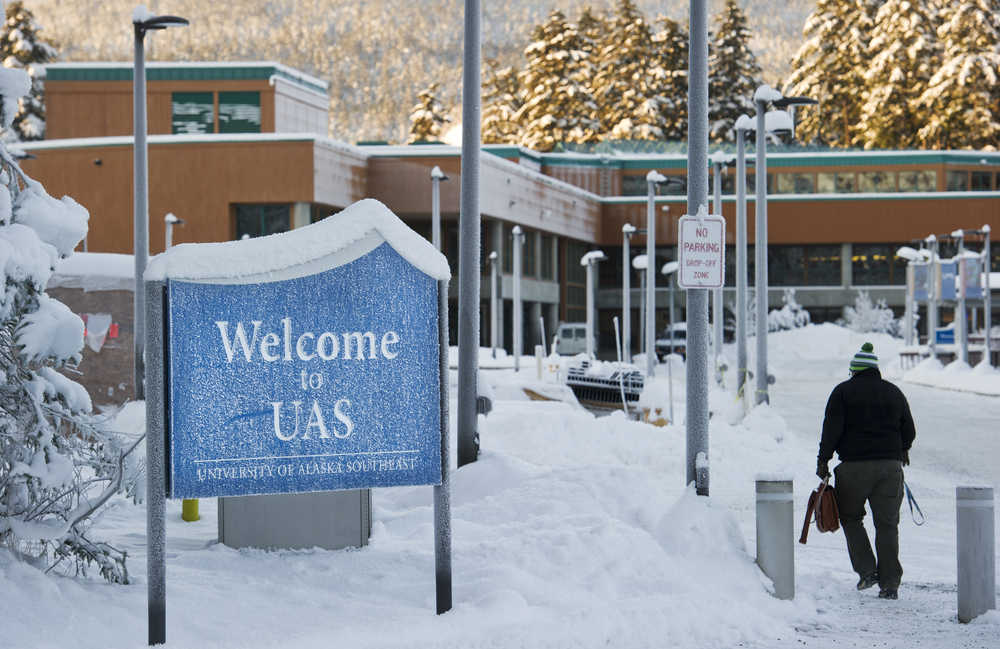The University of Alaska Southeast finds out Wednesday if it will still have a School of Education. The decision is in the hands of the University of Alaska Board of Regents, which has a special meeting the morning of Dec. 14. The board will consider consolidating three schools of education into a single college, and which university will take the lead.
UA President Jim Johnsen has recommended a single college of education headquartered at University of Alaska Fairbanks.
“I touched base in the research literature on those societies in the world that have the highest performing educational systems — Finland, Singapore, Ontario, Shanghai, Japan and others — and what you’ll see in those societies is that teachers are a distinguished profession, they’re held in high prestige, they’re compensated well and, generally speaking, the teacher education programs are at the research universities at those countries,” Johnsen said Monday morning to a crowded Egan Lecture Hall of UAS faculty and staff. “That played a major role in my decision to recommend to the Regents that they base teacher preparation at University of Alaska Fairbanks.”
That recommendation comes with conditions, he said. The school of education at UAF would be accountable to an advisory group made up of stakeholders from all three colleges, school of education faculty would continue to teach across the state and there would be revenue sharing among the colleges.
“(President Johnsen) said UAF leads the system in one of the most widely reported measures of quality — graduation rate — and also in measures such as STEM students as a portion of the student body, Alaska Native students as a portion of the student population, and externally funded research,” according to a UA press release issued today.
Currently, all three schools in the UA system — University of Alaska Anchorage, UAF and UAS — has its own school of education and each school has its own dean. During its September meeting, the board endorsed the recommendation to consolidate the three schools of education into one with a single dean. At the board’s November meeting, the body deferred voting on the recommendation that UAF be the lead.
“At the meeting itself there was a lot of discussion around the rationale and trying to better understand President Johnsen’s rationale and the research that supported it and the activities that supported it, so some of the Regents just felt like they needed a bit more time to digest what was being recommended and have a bit more time to study it,” University of Alaska spokesperson Robbie Graham told the Empire by phone Tuesday.
UAS Chancellor Rick Caulfield said during a phone interview today that he supports the direction of having a single school of education. But, he said that school should be headquartered at UAS.
“This is the most logical area where the University of Alaska Southeast can play a meaningful statewide role in providing academic leadership, and that’s the case we made to the president,” Caulfield said.
He said it’s important to strike the right balance between the three universities. Speaking to UAS’s strength in teacher education, Caulfield listed off its effectiveness in producing graduates, efficiency, success in producing Alaska Native teachers and its educational leadership programs.
“There are other things certainly that Anchorage does in terms of health care, business and finance, and similarly in Fairbanks with Arctic research and engineering, and so forth,” Caulfield said.
Under Johnsen’s recommendation, Caulfield said UAS would retain its 14 full-time education faculty and a number of adjunct faculty (although they would technically become UAF faculty), and offer teacher education programs for Southeast.
“But inevitably when you have a dean who is hundreds of miles away, you’re always concerned with whether the priorities of the institution here in Southeast Alaska will be given full consideration,” he said.
Caulfield added, “The immediate economic impact is probably not as big of a concern; it’s more for the long term — what the implications are for UAS as part of the state-wide system.”
UAS Professor of Education Dave Marvel is wondering the same thing.
“We would become faculty members of UAF, and then what’s the timeline for the rest of the university to be subsumed by Fairbanks,” he said on the phone today.
He supports UAS being the administrative head of the single school of education. So do at least 110 others. Since its November meeting, the Board of Regents has received that many emails or letters either in opposition to UAF leading the school of education or in support of UAS leading the school of education, according to UA spokesperson Robbie Graham. Only 10 letters supported consolidation at UAF.
One of the 110 letters came from Soldotna High School teacher James Harris, who was recently named the 2017 Alaska Teacher of the Year. In a letter to the Board of Regents dated Dec. 9, Harris wrote, “When I made the choice to begin my career in secondary education, I wanted to enroll in the very best program in the state. There was no contest. In my opinion, the (Masters of Arts in Teaching) program in Juneau surpassed all other offerings in the UA system, even those of my graduate school alma mater, UAF.”
The Board of Regents meets at UAF 9 a.m. Wednesday, Dec. 14. The meeting can be viewed via live stream at www.alaska.edu/bor/live/. The agenda for the meeting, and for all committee and full board meetings are available at www.alaska.edu/bor/agendas/.
Consolidating the three schools of education into one school at UAF also would depend on approval from the Northwest Commission on Colleges and Universities, which accredits UA’s three main universities.
• Contact reporter Lisa Phu at 523-2246 or lisa.phu@juneauempire.com.

